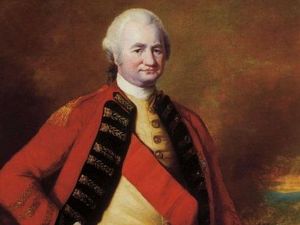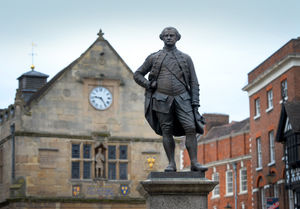Robert Clive – hero or villain?
Clive of India has been distinctly wobbly on his perch in the Square in Shrewsbury amid calls to pull the statue down. But how much do those on both sides of the argument really know about him? Here Bishop's Castle writer, author and historian BOB FOWKE makes the case to let him be.

Like many great men, Robert Clive had big virtues and big vices. Recently there’s been much talk of his vices with not much to balance them. As one of Shropshire’s most famous sons, he deserves better.
He was a man of exceptional courage. His rise to fame started when he was 21 and he escaped French-occupied Chennai, trudging 50 miles south to British Fort St David, avoiding enemy troops, where he volunteered to join the British force without a salary.
Shortly after, it’s said he accused a man of cheating at cards, was challenged to a duel, shot and missed, and when his opponent pointed his pistol and ordered him to retract, Clive said, ‘I said you were a cheat and you are a cheat’.
His first big moment came when he was 34. He led a force of 500 men inland from Chennai, took the fort at Arcot and held it against an army of more than 100,000 men, including 600 French artillery men, for over three months.
It was this siege and the later Battle of Plassey that led to Britain becoming the foremost European power in India, rather than France.
His courage was part of the reason for his success and he faced death unflinchingly on many occasions. In fact, one of the affectionate Indian names for him was Bahadur, ‘the Brave’. Once, when wounded by a French sword slash, the two men supporting him were killed by a bullet passing through their heads. Clive, slumped half-conscious between them, escaped.
Later in Bengal, during the Bata Mutiny, he confronted a whole regiment of angry armed men, alone and unarmed – and persuaded them to back down.
He was not merely brave, he was humane. By comparison with other major figures, men such as Churchill, Napoleon or Wellington, few deaths resulted from Clive’s victories. Wellington counted the deaths in tens of thousands; Clive counted them in hundreds at worst.
During the dying days of the Moghul Empire in India when Clive was active, the figures speak for themselves: 1739, Persian sack of Delhi, 25,000 civilians massacred; 1741-51, Maratha invasions of Bengal, 400,000 civilians killed; 1757, Clive’s victory at Plassey, 500 dead; 1761, Battle of Panipat, Rohilla massacre of Maratha prisoners, 34,000 killed.

After the Bata Mutiny, Clive had no one lashed or executed. The ringleaders were simply ordered to sail back to England. Why such a man should be described, as he has been recently, as "almost a social psychopath", is beyond comprehension.
In his personal life Clive could be charming, autocratic – and difficult. Like all high achievers, he was a driven soul but he was also a loyal friend and was happily married for many years.
His wife Margaret was a clever, funny woman whose interests were astronomy – she corresponded with the astronomer Herschel – and music.
They were cultivated people. She once had the young Mozart play for her, her brother Nevil was Astronomer Royal, and Clive's close friend, John Walsh was a member of the Royal Society for his work on the ‘electric eel’. Far from being a psychopath, Clive’s domestic life was peaceful, at least when he was not tormented by pain or depression.
At home in the evening, he and Margaret tended to socialise with old friends and family. Margaret might practise her music or Clive might take their little niece Peggy on his knee and coax her to tell him all the naughty words she had learned at school.
Margaret, writing to him after the completion of Claremont, yet another of their stately homes, said‘I have a charming new house for a charming old husband’.
His chief faults were financial but they do not include the fortune he extracted from the Bengal government after the Battle of Plassey, which is usually cited against him – it was modest by Indian standards at that time.
Less honourable was all the insider trading and other dealings, which were far from saintly.
Nothing about this tormented, brilliant man’s career justifies the removal of his statue. He had nothing to do with the slave trade.
The horrific Bengal Famine of 1770 happened after his return to England. He was not even a proper imperialist – there was no British Empire in India at that time and no one, Clive included, wanted to create one.
He fought for the interests of the East India Company, his employer, and for his country and there’s nothing wrong with that.
Why would anyone want to remove the statue of such a remarkable man?
In brief: Who was Robert Clive?
Clive was born on the Styche Hall estate, near Market Drayton, in 1725 and went to school in London before travelling to India with the East India Company in 1743.
After two years in Britain, in 1755 Clive returned to India and two years later retook Calcutta (now Kolkata) for the company at the Battle of Plassey, a key moment on Britain's path to controlling Bengal and then India for almost two centuries.
Corruption and looting saw Clive amass a huge amount of wealth and he returned to Britain in 1760, aged 34.
He was made Baron Clive of Passey, knighted and became Shrewsbury's MP, a position he held until his death.
He went back to India in 1765 for two years before returning to Britain where the activities of Clive and the East India Company in India came under sustained attack.
The famine of Bengal that lasted between 1769 and 1773 and killed around a third of the region's population was said to have largely been caused by the company's policies.
Clive defended himself in Parliament, saying "I stand astonished at my own moderation," and in 1773 Parliament declared that he did “render great and meritorious services to his country.”
He died at home in London aged 49 and is believed to have killed himself.
All the petitions can be found by searching ‘Clive of India’ on change.org.




